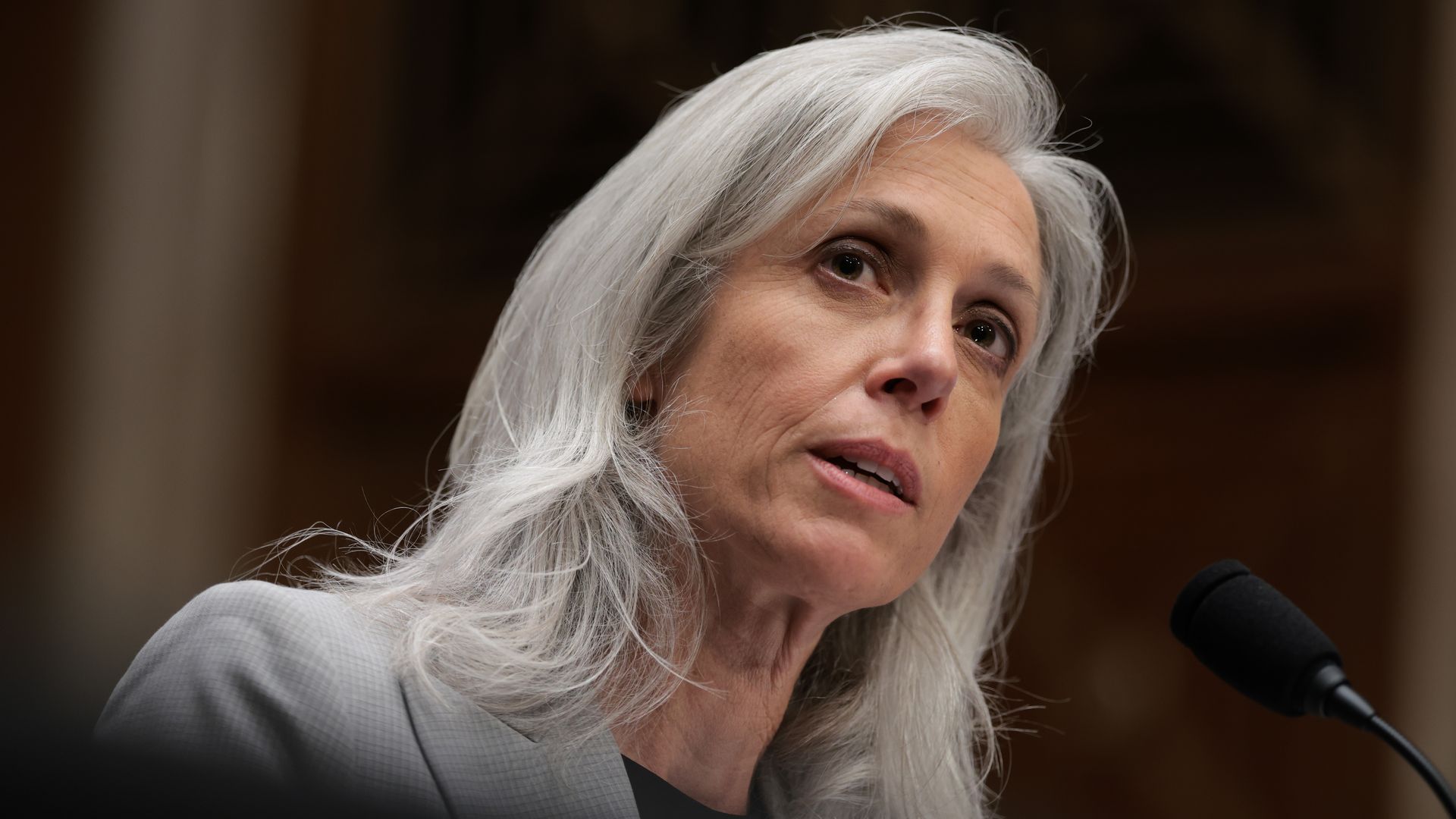White House Press Secretary Karoline Leavitt on Thursday stunned Washington with a blunt announcement that President Donald Trump had dismissed Centers for Disease Control and Prevention (CDC) Director Susan Monarez, declaring that she was “not aligned” with his agenda. Speaking to reporters with her characteristic sharp delivery, Leavitt said the president had grown increasingly dissatisfied with Monarez’s refusal to adapt to what Trump describes as his mission to “make America healthy again.”

“This president was elected to deliver results for the American people,” Leavitt said. “The statement from Ms. Monarez’s attorneys only confirmed what had already become clear: she was not fit for the mission of the president.”
The firing capped a dramatic 24 hours in which confusion swirled around the leadership of one of the nation’s most important public health agencies. Late Wednesday night, the Department of Health and Human Services (HHS) issued a statement that Monarez, who had only been sworn in less than a month ago, had been terminated. That statement sparked immediate backlash, with Monarez’s legal team pushing back, insisting that she remained the lawful head of the CDC until and unless she was removed directly by the president. By Thursday morning, the White House had confirmed exactly that had happened.
Monarez’s attorneys painted her dismissal as the result of principled resistance to political interference. “When CDC Director Susan Monarez refused to rubber-stamp reckless, unscientific directives and fire dedicated health professionals, she chose to protect the public rather than serve a political agenda,” the statement from her lawyers read. “For that reason, she was targeted.”
The clash highlighted not only the tensions between the Trump administration and career public health officials but also the fragile state of trust in America’s scientific institutions. Monarez had been sworn in with promises to restore credibility and stability after years of turnover at the CDC. Instead, her brief tenure ended with what many described as a collision course with Trump’s approach to health governance.

Leavitt, however, defended the president’s authority in stark terms. “The president has every right to fire people who do not fit with his mission,” she told reporters. “This woman never received a single vote in her life, and the president was elected to deliver for the American people. That is the reality. A new replacement will be announced very soon, either by the president or the secretary.”
Behind the terse words and formal statements lies a deeper political struggle over the role of science, governance, and loyalty in Trump’s second term. Allies of the president see Monarez’s removal as a necessary step to clear out what they describe as an entrenched bureaucracy resistant to change. Critics view it as yet another example of Trump punishing those who place professional ethics over political convenience.

Monarez, a career scientist with decades of experience, had entered the role under high expectations from the public health community. Her reputation as a careful, data-driven leader was seen by many as a chance for the CDC to regain ground after years of public skepticism and pandemic mismanagement. Yet from the beginning, insiders said, she was under pressure from White House aides to move faster, speak more positively about Trump’s health agenda, and support policy changes that many scientists found troubling.
One flashpoint reportedly involved directives regarding staffing changes inside the CDC. According to officials familiar with the situation, Monarez resisted calls to fire several long-serving epidemiologists who had clashed with administration appointees. She also pushed back against language in official guidance documents that downplayed certain public health risks. These disputes, while technical, reflected a broader philosophical divide: Trump’s demand for streamlined, results-oriented messaging versus Monarez’s insistence on detailed, science-first communication.
The result was a standoff that could not last. On Wednesday, when HHS announced her firing, confusion reigned because her attorneys maintained that only the president himself could remove her. Within hours, that ambiguity was resolved when Trump personally delivered the termination.
The drama quickly spilled into the political arena. Democrats denounced the firing as an attack on scientific integrity. Several lawmakers accused the administration of silencing experts in favor of loyalists. “This is a dangerous precedent,” one senator said. “If public health leaders are fired for telling the truth, who will protect the American people in the next crisis?”
Republicans largely rallied behind Trump. Supporters argued that he had been elected precisely to challenge the status quo and shake up federal agencies that, in their view, had grown bloated and resistant to accountability. “The president is putting America first,” one GOP congressman declared. “If someone at the CDC doesn’t share that mission, they should not be in charge.”
The spectacle of an ousted CDC director just weeks into her tenure underscored the fragility of leadership at the nation’s premier health agency. Since the pandemic, the CDC has endured intense scrutiny, internal turnover, and mounting political pressure. Monarez had been billed as the figure who might stabilize the agency, but her downfall revealed how difficult it remains for scientific leaders to navigate the crosscurrents of politics in Trump’s Washington.
For Trump himself, the firing was cast as a demonstration of authority. The president, according to aides, wanted to send a message that he would not tolerate internal resistance, particularly in agencies central to his domestic agenda. The CDC, with its influence over health policy, pandemic preparedness, and disease prevention, occupies a unique position at the intersection of science and politics. Whoever leads it wields enormous power, but also faces enormous expectations.
Leavitt’s role in defending the firing drew attention as well. The White House press secretary has gained a reputation for her combative style, unflinching loyalty, and willingness to take on critics. Her statement that Monarez “never received a vote in her life” encapsulated the administration’s argument: public service positions must align with the mandate of an elected president, or else step aside. To supporters, that was common sense. To critics, it was an erosion of the independence that agencies like the CDC are supposed to maintain.
Meanwhile, speculation turned to who might succeed Monarez. Names circulated among political insiders included both health policy veterans loyal to Trump and lesser-known figures within the administration seen as more politically reliable. Whoever is chosen, the appointment will be closely scrutinized as a test of whether the CDC can regain credibility with the public or whether it will be further politicized.
For Susan Monarez, the firing leaves her at a crossroads. Her legal team has not ruled out legal action, arguing that her dismissal was retaliatory and unjustified. Allies say she is weighing her next steps carefully, balancing a desire to continue serving in public health with the reality that she may now be a polarizing figure. Some speculate she could return to academia, while others believe she may emerge as a vocal critic of Trump’s health policies.
The broader implications of her removal will unfold in the weeks ahead. For now, it has sparked a national debate about the boundaries between science and politics, the authority of a president versus the independence of federal agencies, and the future of public trust in institutions like the CDC.
At its heart, the episode reflects a larger question about governance in America: should public health leaders act primarily as scientists or as political appointees? For Trump and his allies, the answer is clear—loyalty and alignment with the president’s agenda come first. For many others, the fear is that such an approach risks undermining the very purpose of agencies designed to protect the public regardless of political winds.
As Thursday ended, Leavitt promised a swift announcement of Monarez’s replacement. “The president is determined to move forward,” she said. “The mission is to make America healthy again, and he will ensure the right people are in place to do it.”
For all the certainty of her words, the uncertainty surrounding America’s public health leadership remains. The firing of Susan Monarez may be over as a political drama, but as a symbol of the struggle between truth and power, science and politics, it is only just beginning.





